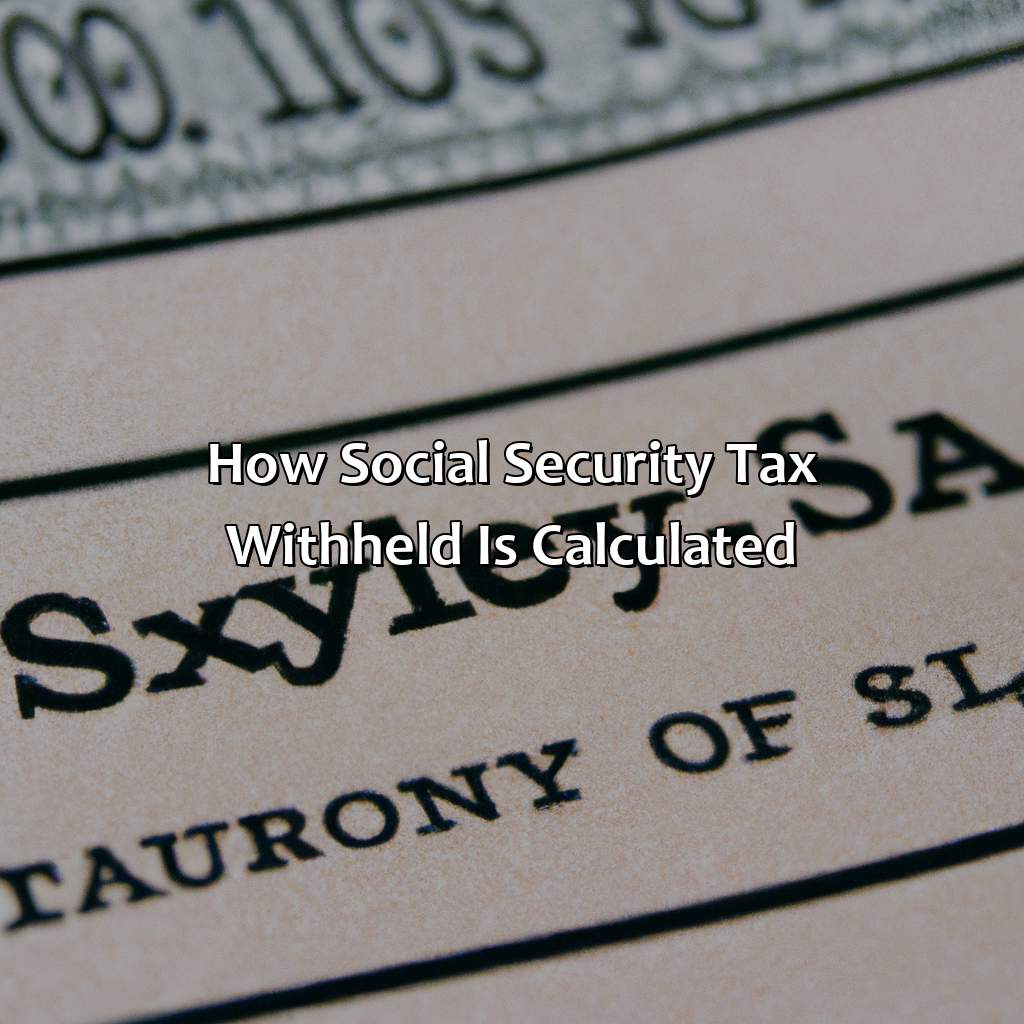What Does Social Security Tax Withheld Mean?
Key Takeaway:
- Social Security Tax Withheld refers to the amount of money that is taken out of an employee’s paycheck to fund Social Security benefits and programs.
- Social Security Tax Withheld is important because it helps fund programs and benefits that provide financial security for retired, disabled, and surviving individuals, as well as their families.
- Employers are responsible for making sure that Social Security Tax Withheld is calculated correctly and paid on time, and can face penalties for non-compliance.
Puzzled by social security tax withholdings? You’re not alone! With the rise of tax filing season, it’s important to understand what social security tax withheld means and how it affects your tax returns. Discover the answers here!
Understanding Social Security Tax Withheld
Grasping Social Security Tax Withheld? No sweat. We’ll break it down into 3 parts:
- What is it?
- Why is it?
- Who pays?
Let’s get started!
What is Social Security Tax Withheld? Social Security Tax is a tax paid to the government which funds Social Security benefits for retired or disabled individuals. Social Security Tax Withheld is the portion of this tax that is taken directly out of an employee’s paycheck each pay period.
Why is it Withheld? The purpose of withholding Social Security Tax from an employee’s paycheck is to ensure that the necessary funds are available to fund Social Security benefits for those who need them.
Who Pays Social Security Tax? Both employers and employees are required to pay Social Security Tax. The employee pays 6.2% of their wages, while the employer pays a matching 6.2%. This means that a total of 12.4% of an employee’s wages goes towards Social Security Tax.
Simple, right?

Image credits: retiregenz.com by Joel Arnold
What is Social Security Tax Withheld?
As a part of the payroll process, employers are mandated by law to withhold a certain amount of money from their employees’ paychecks for Social Security tax purposes. This withholding helps fund Social Security benefits and is calculated at a fixed percentage rate on the earned wages up to a specified limit per year. The amount withheld depends on the employee’s total salary and varies accordingly.
Social Security tax withheld is an essential aspect of the payroll system and helps the government provide retirement, disability, and survivor benefits to eligible citizens in need. This tax deduction is crucial for employees to receive future financial support from the government during their retirement years or if they become disabled before reaching retirement age. Employers must also contribute to this fund by matching their employee’s Social Security contributions.
It is noteworthy that the collected funds don’t go into individual accounts but form a larger pool, from which Social Security payments are made every month to qualifying retirees, survivors or beneficiaries who have reached specific criteria set by law. The withholding rates can also be calculated as per social security wage base limits annually designated as $142,800 in 2021.
Dating back to its roots during President Franklin D. Roosevelt’s administration in 1935, Social Security has helped millions of Americans lead better lives after retirement or disability issues. By enforcing employers and employees alike to share in funding this program sustainably through regular deductions contributes significantly to maintaining an economically stable society over time.
Social Security Tax is like that friend who always borrows money from you and promises to pay you back, but you never actually see the cash.
Why is Social Security Tax Withheld?
For Social Security taxes, the employer is responsible for withholding a percentage from an employee’s paycheck. This deduction ensures that employees pay their share of Social Security contributions, which goes into the Social Security Trust Fund. This fund provides retirement, disability, and survivorship benefits to eligible individuals.
Social Security tax withheld from an employee’s paycheck helps ensure that they are making contributions towards their future benefits. Without this deduction, individuals may not have enough funds saved up to support themselves during retirement or in case of unexpected events. By taking out a portion of an employee’s earnings before they receive them, it helps promote financial responsibility and provides peace of mind for the future.
It’s important to note that there is a limit on how much income can be taxed for Social Security purposes each year. Once an individual has reached that limit, any additional income they earn will not have Social Security taxes withheld from it. Additionally, self-employed individuals are responsible for paying both the employer and employee’s portions of the Social Security tax themselves.
Pro Tip: It’s essential to keep track of your W-2 forms and your paycheck stubs to ensure that your employer is withholding the correct amount of Social Security tax. It can be helpful to consult with a financial advisor or accountant if you have questions about your specific tax situation.
Even if you’re not a fan of taxes, Social Security tax is like the responsible friend who always pitches in for the group’s dinner bill.
Who Pays Social Security Tax?
Individuals earning income from employment, self-employment or those who are receiving certain benefits are required to pay social security tax. This tax is levied to fund the social security program which provides retirement, disability and survivor benefits to eligible individuals. Employers also contribute an equal amount of social security tax on behalf of their employees.
The amount of social security tax paid by an individual depends on their earnings. They pay 6.2% of their gross income for Social Security up to a certain limit and 1.45% of their total income for Medicare tax without any limit.
It’s important to note that individuals with higher incomes may be required to pay additional taxes, such as the Additional Medicare Tax and the Net Investment Income Tax.
Interestingly, the concept of social security tax was first introduced in Germany by Chancellor Otto von Bismarck in 1889. The United States implemented a similar system during the Great Depression under President Franklin D. Roosevelt in 1935 through the Social Security Act.
If only calculating your crush’s interest in you was as easy as calculating Social Security tax withheld.
How Social Security Tax Withheld is Calculated
Calculating Social Security Tax Withheld from your paycheck? You need to know the Rate, Maximum Taxable Earnings, and Taxable Compensation. These 3 factors decide the amount of your Social Security benefits. Here’s what they mean:
- Rate = tax rate.
- Maximum Taxable Earnings = highest amount of salary subject to Social Security tax.
- Taxable Compensation = salary subject to Social Security tax.
Simple!

Image credits: retiregenz.com by Yuval Duncun
Social Security Tax Rate
The rate of the tax deducted for Social Security is determined based on specific criteria. This includes income and employment status, and it is set by the government annually.
| Year | OASDI Tax Rate |
| 2022 and beyond | 12.4% (6.2% employee & 6.2% employer) |
| 2021 | 12.4% (6.2% employee & 6.2% employer) |
| 2020 | 12.4% (6.2% employee & 6.2% employer) |
It’s important to note that there is a cap on the amount of income that is subject to the Social Security tax each year, which changes annually as well.
The US government sets the Social Security tax rates each year based on income and other criteria, including employment status and revenue generation for Social Security programs, like retirement benefits or disability insurance programs.
According to the Internal Revenue Service (IRS), social security taxes collected in fiscal year (FY)2020 amounted to $1,062 billion dollars from which $944 billion was direct collections while $118 billion were reimbursements from general revenues for lump-sum payments garnered in previous years under deferred compensation plans for state and local governments and nonprofits without Social Security coverage.
Time to start asking your boss for a raise, because once you hit that maximum taxable earnings limit, you won’t be seeing any more social security deductions on your paycheck.
Maximum Taxable Earnings
For the Social Security Tax Withheld, there is a limit to the maximum taxable earnings. This amount is used to calculate the Social Security tax withholding from an employee’s paycheck. The amount changes every year and depends on various factors.
The following table shows the Maximum Taxable Earnings for recent years:
| Year | Maximum Taxable Earnings |
|---|---|
| 2021 | $142,800 |
| 2020 | $137,700 |
| 2019 | $132,900 |
It is essential to note that Medicare tax doesn’t have a maximum taxable cutoff, meaning all covered wages are subject to Medicare tax.
Understanding the maximum taxable earnings for Social Security taxes can help employees plan their finances and make more informed decisions about their withholding amounts.
In 1935 when President Franklin D. Roosevelt signed the Social Security Act into law, it provided benefits for retirees based on their payroll contributions. Since then, maximum taxable earnings have been adjusted regularly in response to inflation and other economic conditions.
Taxable compensation: the only thing worse than paying taxes is paying taxes on your taxes.
Taxable Compensation
Compensation subject to Social Security tax is designated as ‘Remunerative Income.’ It includes salaries, bonuses, commissions, and vacation pay. There are some exceptional types of income such as reimbursements for work expenses, disability wages, and sick pay that do not fall under Remunerative Income.
The taxable compensation’s calculation takes into account the Federal Taxable Wages or Box 3 on an employee’s W-2 form. Employers deduct the appropriate Social Security taxes from the employee’s taxed income based on the agreed-upon percentage rate that their employer has set.
Notably, salary reduction programs such as 401(k) deductions may affect Social Security tax withholding rates because deductions will result in untaxed income lowering your overall earned compensation subject to taxation.
According to Investopedia, the standard percentage rate for Social Security tax withholding is 6.2% of your earned taxable compensation for employees in 2021 (up to a salary cap of $142,800).
Who needs a savings account when you have a trusty social security tax withheld? It’s like a forced retirement plan that you never asked for!
Benefits of Social Security Tax Withheld
Uncover the perks of social security tax! Three types of benefits are waiting for you: Social Security, Disability, and Survivor Benefits. Each has its own value for the person paying into the social security system. Let’s explore them in more detail!

Image credits: retiregenz.com by David Woodhock
Social Security Benefits
Social Security tax withheld refers to the amount of tax collected by the government from employees’ salaries to fund retirement, disability and survivor benefits. Here are three benefits of Social Security Tax Withheld:
- It offers guaranteed income after retirement, reducing poverty among seniors.
- The disability benefit helps workers with health issues who are unable to work before reaching retirement age.
- Survivor benefits help spouses, children and dependants of deceased beneficiaries.
It’s important to note that Social Security taxes are not just for retirees but also cater to individuals with disabilities and their families. Finally, Social Security has been expanded several times since its origination in 1935, including additional protection for women and disabled Americans.
Who needs functioning limbs when you have disability benefits to fall back on?
Disability Benefits
For those who experience health issues rendering them unable to work, there are programs such as disability benefits that provide financial assistance. These benefits are designed to help cover living expenses and medical bills for individuals who can no longer earn an income due to disability.
People with disabilities who have worked long enough and paid Social Security taxes may be eligible for Social Security Disability Insurance (SSDI) or Supplemental Security Income (SSI) benefits. SSDI provides financial support if you’re unable to work due to a disability before you reach retirement age while SSI offers assistance based on your financial need.
It’s important to note that the eligibility requirements and amount of benefit received vary depending on a number of factors including the cause of disability, age, employment history, and income level. It’s recommended to consult with a qualified professional to explore available options.
If you’re eligible for these programs but do not apply, you may be missing out on essential support that could improve your quality of life. Don’t let fear or uncertainty hold you back from seeking the help you deserve. Contact your local Social Security Administration office or schedule an appointment with a representative today.
I guess you could say Social Security survivor benefits are like life insurance, except instead of paying premiums, you just have to pay taxes for your entire working life.
Survivor Benefits
The following are some benefits offered by Survivor Benefits:
- Monthly benefit payments to eligible family members
- Lump-sum death payment to a surviving spouse or dependent children
- Social Security credits for the deceased worker’s earnings history
- Ability for spouse to receive full Retirement Benefits when they reach the age of 70 and switch from Survivor Benefits
- Military service credit for active duty before 1957
It’s important to note that eligibility requirements vary based on individual circumstances. Some unique details include special rules for divorced spouses, widows/widowers who remarry after age 60, and children with disabilities.
In one case, a friend lost her husband suddenly and was left without financial support. Thanks to Survivor Benefits, she was able to receive monthly income and provide for her family during this difficult time.
Looks like you’ll have to part with some of your hard-earned cash, but hey, at least you’re contributing to the retirement fund of some lucky senior citizen.
What Social Security Tax Withheld Means for Employees
Grasp the concept of Social Security tax withheld? No worries – here’s the info. It impacts your paycheck! This section dives into its effect on earnings. Plus, two sub-sections help you comprehend this better. Learn how to check Social Security tax withheld. Get an understanding of how it works!

Image credits: retiregenz.com by Joel Jones
How Social Security Tax Withheld Affects Paycheck
Social Security contributions directly impact an employee’s take-home pay. When social security tax is withheld from an employee’s paycheck, it reduces their earnings before taxes are calculated. This means that an employee’s taxable income decreases along with their overall tax liability. The reasoning behind this tax withholding is to ensure that employees contribute to the Social Security fund, which supports programs for retired and disabled individuals.
Additionally, employers also contribute to the Social Security system by matching employees’ contributions. This means that not only do employees benefit from contributing to the fund but so does their employer, further incentivizing contribution.
The act of withholding social security taxes began back in the 1930s as part of President Franklin D. Roosevelt’s New Deal program. At the time, these contributions were voluntary and intended to act as a form of retirement savings for Americans who could not create individual retirement accounts or rely on employers for assistance after retiring.
Get your detective hat on and learn how to sleuth out your social security tax withheld like a pro.
How to Check Social Security Tax Withheld
Employees can check the amount of Social Security Tax withheld from their paychecks. Here’s how to ensure it’s accurate:
- Review your paycheck stub or payslip for the current pay period.
- Locate the social security tax line on your paycheck stub, and note the dollar amount withheld.
- Multiply that amount by the number of pay periods in a year – typically 26 if paid biweekly, or 52 if paid weekly.
- Compare this result to the total amount of Social Security tax you should have paid based on your taxable income and percentage rate established by the Social Security Administration (currently set at 6.2%).
- If there’s a discrepancy, speak with your employer or human resources representative to identify any errors in calculation.
- If necessary, request an adjustment with the IRS on Form 941-X.
It’s important to remember that Social Security tax is calculated based on a fixed percentage of taxable income up to a certain limit each year. Those whose earnings go beyond this threshold will stop paying Social Security taxes once they hit that cap.
Pro Tip: Remember, Social Security tax withheld from an employee’s paycheck is only a portion of what they will owe. In addition to withholding, employers also contribute to employees’ Social Security payments with matching funds.
To employers, social security tax withheld means less money to spend on office snacks and holiday parties.
What Social Security Tax Withheld Means for Employers
Employers need to grasp the effect of social security tax withholding. To help them, the section ‘What Social Security Tax Withheld Means for Employers‘ has two sub-sections. They are ‘Employer’s Responsibility‘ and ‘Penalties for Non-compliance with Social Security Tax Withheld‘. These sub-sections offer insight into these tax withholding matters.

Image credits: retiregenz.com by David Washington
Employer’s Responsibility
Employers bear the responsibility of withholding social security tax from employees’ wages. This is essential for all those who keep records to ensure compliance with the Internal Revenue Service (IRS) regulations. The employer’s responsibility to withhold Social Security and Medicare taxes does not cease even if the employee fails to provide requisite data needed to calculate their withholding.
It is important for employers to understand that they can be held liable for any unremitted taxes, interests or penalties resulting from errors in calculating or failing to remit social security tax withheld. To minimize this risk, employers must ensure that they accurately calculate and timely file the taxes and maintain relevant documentation. Additionally, it is a good practice to provide quarterly statements reflecting employee wage information and social security tax withheld.
As an additional tip, employers should use the Electronic Federal Tax Payment System (EFTPS) to make payments as it ensures timely submission with accurate reporting.
Skipping out on social security taxes is like trying to ghost your ex – it might seem like a good idea at the time, but chances are it will come back to haunt you with penalties galore.
Penalties for Non-compliance with Social Security Tax Withheld
Non-compliance with Social Security Tax Withheld can lead to fines and legal consequences. Here is a breakdown of the penalties employers may face:
| Penalty Type | Description | Amount |
| Civil Penalty for Late Payment and Filing | If an employer fails to file tax returns or pay taxes on-time. | 0.5% to 25% of unpaid taxes, depending on how late the payment was made. |
| Civil Penalty for Underpayment or Non-Payment | If an employer does not deduct social security tax from employees or underpays the amount due. | 2% to 15% of the underpaid amount. |
| Criminal Penalty for Fraudulent Activity | If an employer intentionally avoids paying social security taxes through fraudulent means. | Fines up to $10,000 or imprisonment for up to five years or both. |
| Civil Damages Lawsuits by Employees | If an employer fails to withhold and remit employee’s share of social security taxes, employees can file lawsuits requesting past employment taxes be paid plus any penalties and interest. | Vary Depending on the damages incurred by the employees, including wages owed plus legal fees. |
Employers should keep track of their Social Security Tax Withheld records, making certain it complies with IRS regulations as non-compliance can cause considerable financial setbacks.
A variation in case law interpretation suggests that Courts are becoming more vocal in demanding Employers comply. Hence Employers withholding Social Security Taxes must stay abreast with all pertinent IRS regulations.
For example, one catering business in Texas neglected to remit its social security taxes for a long time inadvertently. The business not only had to pay fines and penalties but also damages to its employees, which ultimately put them out of business.
Five Facts About Social Security Tax Withheld:
- ✅ Social Security tax is a tax that is withheld from employee wages to fund Social Security benefits. (Source: IRS)
- ✅ The current Social Security tax rate for employees is 6.2%, and the employer also pays a matching 6.2%. (Source: Social Security Administration)
- ✅ Social Security tax is only withheld on the first $142,800 of an employee’s earnings in 2021. (Source: IRS)
- ✅ Self-employed individuals pay both the employer and employee portion of Social Security tax, which is known as the self-employment tax. (Source: IRS)
- ✅ Social Security benefits are calculated based on an individual’s earnings history and the age at which they begin receiving benefits. (Source: Social Security Administration)
FAQs about What Does Social Security Tax Withheld Mean?
What does social security tax withheld mean?
When you receive a paycheck, you may see a deduction labeled “Social Security Tax Withheld.” This refers to the tax that is taken out of your paycheck to fund the Social Security program, which provides retirement, disability, and survivor benefits to eligible individuals.
How is the Social Security tax rate determined?
The Social Security tax rate is set by law and is currently 6.2% for both employees and employers. However, self-employed individuals are responsible for paying the full 12.4% themselves.
What is the maximum amount of Social Security tax that can be withheld in a year?
For the year 2021, the maximum amount of earnings that are subject to the Social Security tax is $142,800. This means that the maximum amount of Social Security tax that can be withheld from an employee’s earnings in a year is $8,853.60.
Is Social Security tax the same as Medicare tax?
No, Social Security tax and Medicare tax are two separate taxes that are withheld from your paycheck. The Medicare tax rate is currently 1.45% for both employees and employers, and there is no maximum income limit for Medicare tax withholding.
Can I get a refund for Social Security taxes withheld?
No, you cannot get a refund for Social Security taxes withheld from your paycheck. However, if you overpaid Social Security tax due to having multiple employers during the year, you may be eligible for a credit when you file your income tax return.
What happens to the Social Security taxes that are withheld from my paycheck?
The Social Security taxes that are withheld from your paycheck are used to fund the Social Security program, which provides benefits to eligible beneficiaries. The money is put into a trust fund that is used to pay current and future beneficiaries.
